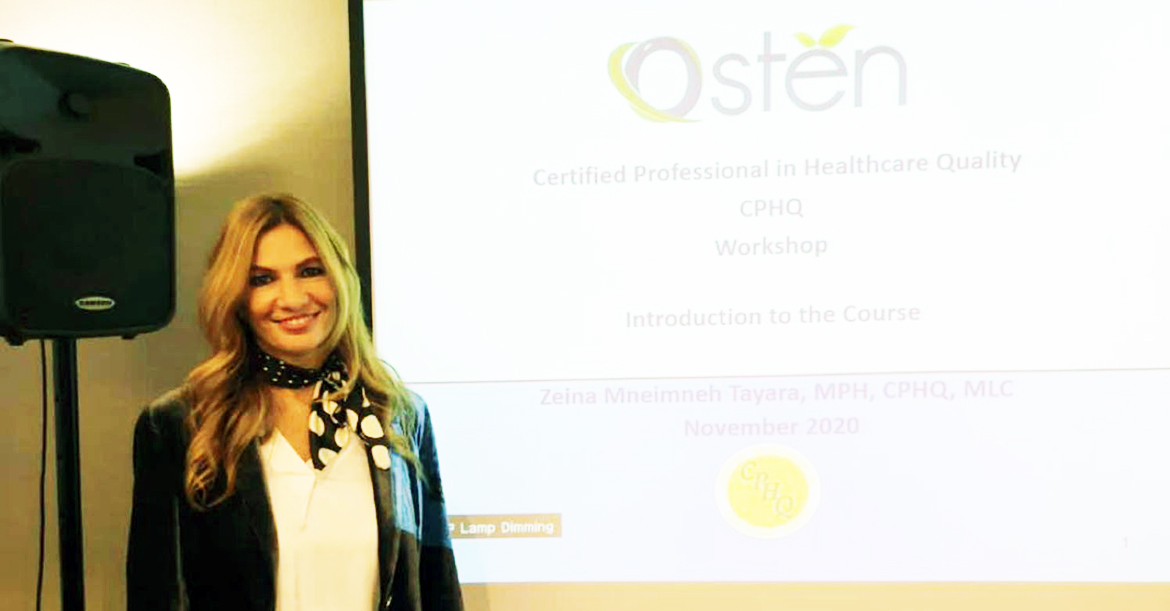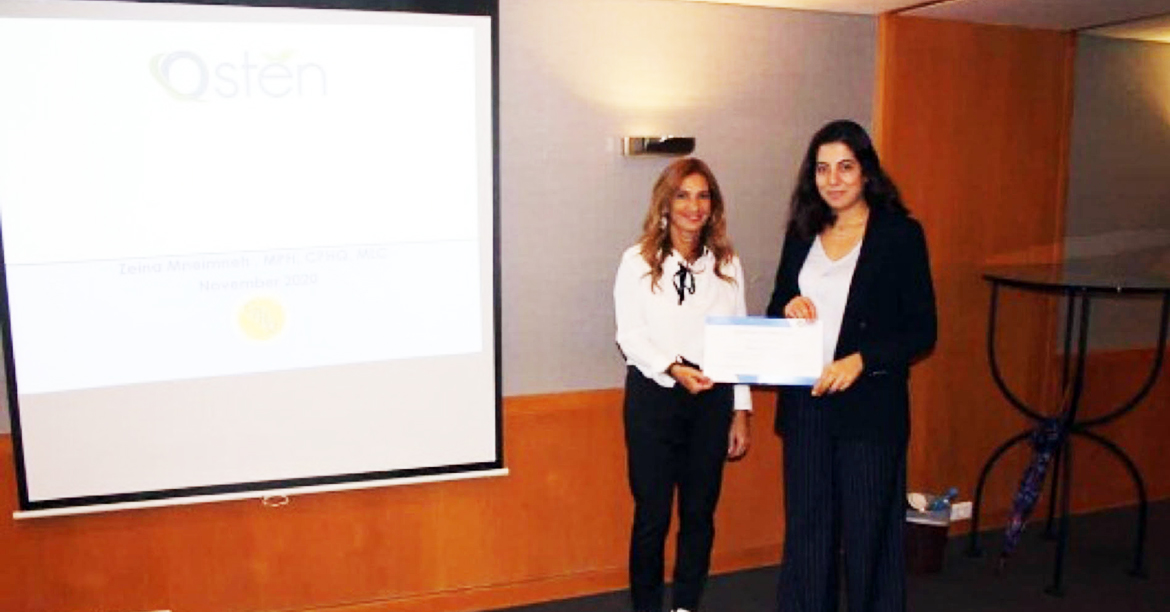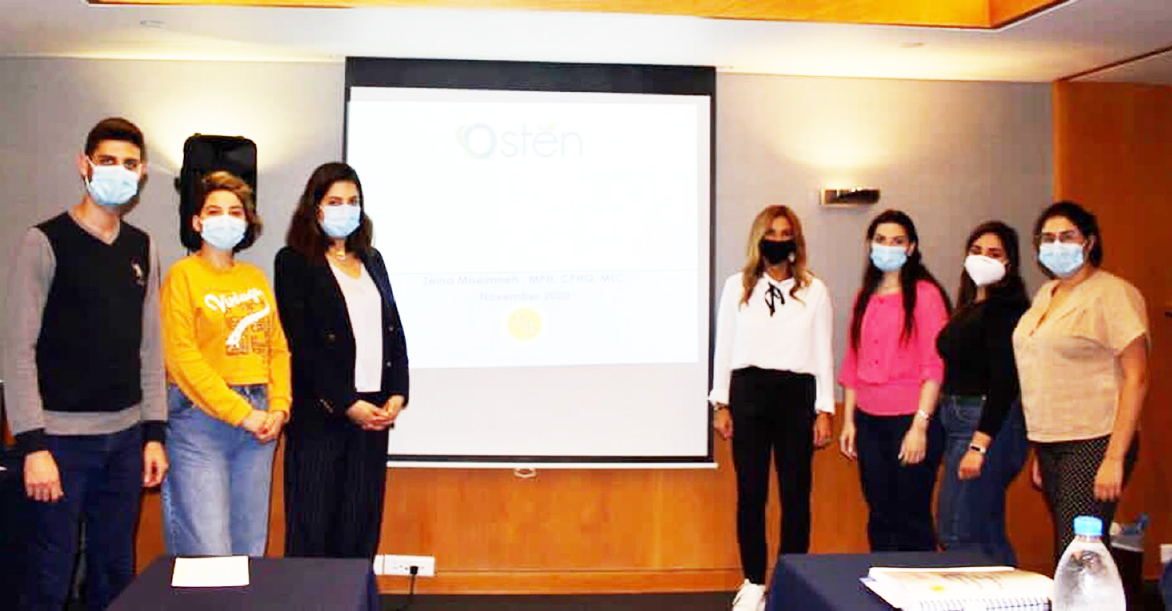Certified Professional in Healthcare Quality (CPHQ)
Training Course
8 Days' Online Training Course - 30 Hours
8 Days' Online Training Course - 30 Hours

This five-day condensed course is designed for healthcare quality professionals who are planning
to take the CPHQ exam, who wants to get recertified and other professionals seeking to sharpen their healthcare managerial
skills.
The course is an intensive review of the comprehensive body of knowledge that is designed to provide the participants with the required information to take the CPHQ exam.
It includes healthcare quality management principles and patient safety issues presented by way of lectures, discussions, demonstrations, small group work, case studies, and a review of the CPHQ exam mock questions and answers.
 What is CPHQ?
What is CPHQ?
 Topics Covered in the Course
Topics Covered in the Course
 Learning Objectives
Learning Objectives
By the end of the course participants will be able to:
 Who Should Attend?
Who Should Attend?
This course is designed for:
 Participant’s Evaluation
Participant’s Evaluation
 References
References
 Course Schedule
Day 1
Course Schedule
Day 1
Download Brochure !
The course is an intensive review of the comprehensive body of knowledge that is designed to provide the participants with the required information to take the CPHQ exam.
It includes healthcare quality management principles and patient safety issues presented by way of lectures, discussions, demonstrations, small group work, case studies, and a review of the CPHQ exam mock questions and answers.
The granting of Certified Professional in Health Care Quality (CPHQ) status recognizes
professional and academic achievement by individuals in the field of healthcare quality
management.
The comprehensive body of knowledge includes quality management, accreditation, quality improvement, case/ utilization management, & risk management at all employment levels and in all healthcare settings.
CPHQ is the internationally recognized credential in healthcare quality.
The comprehensive body of knowledge includes quality management, accreditation, quality improvement, case/ utilization management, & risk management at all employment levels and in all healthcare settings.
CPHQ is the internationally recognized credential in healthcare quality.
- Healthcare Quality Concepts
- Management and Leadership
- Quality Planning
- The Quality Structure
- Evidence-based Practice
- Quality Management
- Quality Measurement
- Utilization and Care Coordination
- Accreditation of Healthcare Organizations
- Patient Safety and Risk Management
- Healthcare Organization
- People Management
- Healthcare Ethics
- Information Management
- Communication
- Education and Training
- Explain the basic healthcare quality concepts
- Understand the organization-wide strategic planning including development of mission, vision, goals, objectives and leadership values and
commitment - Facilitate the establishment of a performance improvement oversight group, performance Improvement teams and quality champions
- Perform or coordinate patient safety and risk management activities
- Understand the development and revision of performance and risk management improvement plans
- Integrate technology to enhance the patient safety program
- Oversight of data collection methodology using knowledge of epidemiological theory of data collection and analysis
- Use basic statistical techniques to describe and analyze data
- Use or coordinate the use of basic statistical process control components
- Understand epidemiological theory in data collection and analysis
- Participate in the development of clinical guidelines and pathways
- Participate in the credentialing and privileging process
- Conduct quality and related function review and service specific review
- Understand the prevention and control of infection processes
- Participate in evaluating team performance
- Incorporate performance improvement findings into the employee performance appraisal system
- Integrate results of data analysis, outcomes of risk management and utilization management into the performance improvement process
- Integrate quality findings into governance and management activities (bylaws and administrative policies and procedures)
- Integrate accreditation and regulatory recommendations into the organization
- Develop and provide performance improvement training
- Evaluate effectiveness of training
- Facilitate change within the organization through education
- Develop and participate in accreditation and survey activities
- Interact with medical staff and support personnel regarding performance improvement issues
- Promote organizational values and commitment among hospital staff
- Compile and write performance improvement reports
- Integrate quality concepts within the organization
- Coordinate the dissemination of performance improvement information within the organization
- Quality/performance improvement coordinators
- Utilization and case managers
- Patient safety and risk managers
- Hospital management staff
- Health information managers
- Patient relations officers
- Government staff employed in healthcare agencies
- Infection control professionals
- Healthcare professionals employed in health insurance agencies
- Medical staff officers
- Survey coordinators
- Healthcare consultants
- Pre and post tests
- Classroom interaction and participation
- Analysis of case studies and live examples
- Performance in group work
The official and main textbook that will be adopted in this course is: “The Healthcare Quality Handbook: A Professional Resource and Study Guide by Janet A. Brown. The contents of this textbook will serve as a supplement reading material. All participants are encouraged to acquire this textbook.
06:00 - 06:05 Welcome Note
06:05 - 06:30 Introduction of the Course
06:30 - 7:00 Pre-test (15 Questions)
7:00 - 8:00 Healthcare Quality Concepts-1
Day 2 6:00– 7:00 Management and Leadership-2
7:30 -8:30 Quality Planning
Day 3 6:00 - 7:00 Evidence-based Practice
Day 4 6:00 - 7:00 Review Questions and Answers
7:00 - 8:00 Quality Management-3
Day 5 6:00 - 7:00 Quality Measurement-2
8:30 - 9:30 Patient Safety and Risk Management-1
Day 6 6:00 - 7:00 Patient Safety and Risk Management-2
Day 7 6:00 - 7:00 Healthcare Ethics
7:30 - 8:30 People Management
Day 8 6:00 - 7:00 Communication
9:30 - 10:00 CPHQ Exam Tips
10:00 Evaluation of the Course
06:05 - 06:30 Introduction of the Course
06:30 - 7:00 Pre-test (15 Questions)
7:00 - 8:00 Healthcare Quality Concepts-1
- Definition of Quality
- Definition of Quality Management
- Principles of Healthcare Quality
- Aspects of Quality
- Donabedian Concept 8:00 – 9:00 Healthcare Quality Concepts-2
- Dimensions of Quality
- Quality Trilogy
- Total Quality Management
- Edward’s Deming 14 points
- System Thinking
- Leadership and management
- Leadership values and commitment
- Strategic planning process
- Development of vision and mission statements
- Organizational goals and objectives
Day 2 6:00– 7:00 Management and Leadership-2
- Organization structure (lines of authority/accountability)
- Strategic planning
- Linking the performance improvement and patient safety with strategic goals
- Budgeting, budget control, cost centers, cost-benefit and cost-effective analysis
7:30 -8:30 Quality Planning
- Planning and Design of Quality System
- Organizational Influences
- Role of Quality Professional
- Integration of Quality Functions
- Performance Improvement Models
- Quality improvement responsibilities
- Quality Structure
- Teams in quality management
- Quality information flow
- Quality improvement education
Day 3 6:00 - 7:00 Evidence-based Practice
- Standards of care and standards of practice
- Clinical Guidelines, Clinical pathways, protocols, and Algorithm
- Development of Guidelines and Pathways
- Hospital policies and procedures
- Change management within the organization
- Developing a performance improvement plan
- Concept of Customer
- Customer/supplier relationships (internal and external customers)
- Assessment of customer needs/expectations (surveys, focus groups and teams)
- The quality and patient safety culture (assessment and development)
- The establishment of performance improvement priorities (Quality Improvement Process)
- Triggers for Data Analysis
- Outcome measures
Day 4 6:00 - 7:00 Review Questions and Answers
7:00 - 8:00 Quality Management-3
- Definition of Medical Record
- Medical Record as a Review Tool
- Types of Record Review
- Data Sources
- Indicator definition
- Indicator development
- Types of indicators
- Users of quality measures
- Characteristics of indicators
- JCI library of measures
- Process Analysis tools
- Overview and background
- Components of Utilization Management
- Case management
- Disease Management
- Discharge planning
Day 5 6:00 - 7:00 Quality Measurement-2
- Use of basic statistical techniques (mean and standard deviation)
- Comparative data analysis (t-test, regression, and trend analysis)
- Reporting of quality findings (Pareto chart, run chart, scatter diagram, and control chart)1
- Interpretation of data to support decision making
- Computerized systems for data collection and analysis
- Benchmarking
8:30 - 9:30 Patient Safety and Risk Management-1
- Magnitude of the problem - The IOM’s Report
- Incidents, occurrences, and medical errors
- Accident causation theories
- Patient safety program
- The risk management program (risk identification, prevention, control, and financing)
- Professional liability and negligence
- Incident reporting and complaint management
- Sentinel events and near misses
Day 6 6:00 - 7:00 Patient Safety and Risk Management-2
- Failure mode and effects analysis (FMEA)
- Handling patient complaints and medical errors
- Patient safety goals and solutions
- Sentinel/unexpected events - root cause analysis (RCA) and action plans
- The use of technology to enhance patient safety 7:00 - 800 Healthcare Organization
- Universal Coverage
- Managed Care
- Reimbursement systems
- Center for Medicaid and Medicare Services
- Certification, licensure, and accreditation
- The accrediting agencies (The Joint Commission)
- The value of accreditation Hospital standards
- The accreditation survey process
- IsQua international program
Day 7 6:00 - 7:00 Healthcare Ethics
- Definition and principles
- Patient rights and confidentiality of information
- Informed consent
- End-of-life care and medical research
- Medical staff¬ credentialing, privileging, physician profiles and reappointment
- Medical code of ethics
- Ethics and law
- Cases studies
7:30 - 8:30 People Management
- Orientation
- Staff Performance
- Staffing Effectiveness
- Recognition/Reward
- Teams
- QI Team Types
- Roles within QI Teams
- Evaluating Team Performance
- Information Management (IM) Definition
- IM Functions/ Uses/Processes
- Design and Data Collection
- Data Management Processes
- Definition of Epidemiology
- Epidemiological Concepts
- Epidemiology and Quality Management
Day 8 6:00 - 7:00 Communication
- Effective communication
- Informed Consent
- Written Communication
- Dissemination of Performance Improvement Information
- Reporting Techniques
- Hand over Communication - I Pass and SBAR
- The role of communication in quality improvement and patient safety
- E¬ffective teaching
- Learning principles
- Assessing the educational needs
- Developing educational programs
- Assessing the eff¬ectiveness of quality education
- Facilitating change through education
8:00 - 9:00 Class Activities
9:30 - 10:00 CPHQ Exam Tips
10:00 Evaluation of the Course
Download Brochure !
the program
The Program is About
30 Hours
A Pre-Test will be Held at the Beginning of the Course in Order to Assess the Level of the Participants for the CPHQ Exam
- The Sessions Consist of 3 hours
- From 6:00 PM Till 9:00 PM (GMT+3)
- From Monday Till Thursday.
- Management and Leadership
- Quality Planning
- The Quality Structure
- Evidence-based Practice
- Quality Management
- Utilization and Care Coordination
- Accreditation of Healthcare
Organizations
- Patient Safety and Risk
Management
- Healthcare Organization
- People Management
- Healthcare Ethics
- Information Management
- Communication
- Education and Training
Training Methods The director of this course will use a variety of adult learning methods to ensure that participants capture the basic concepts and the knowledge in a way that takes into consideration the variations in their background. The purpose is to review and wrap up all the content outline of the CPHQ Exam including the application aspects. Training methods include but not limited to: - PowerPoint presentations
- Panel discussions
- Demonstrations
- Small group work
- Case studies
- Reviewing CPHQ Q&A
- PowerPoint Presentations
FOLLOW UP AFTER TRAINING Our service does not stop after 5 days of completing the workshop! We follow you continuously until you are ready to sit for the exam.
Any question you have, any clarification needed! we are ready to answer over a zoom call or over a cup of coffee anywhere.
Relax! You don’t have to worry; we will be there for you during and after the workshop and will provide you with additional mock questions to practice. We just want you to become certified and to feel the value that this certification will bring you.
30 Hours
A Pre-Test will be Held at the Beginning of the Course in Order to Assess the Level of the Participants for the CPHQ Exam
- The Sessions Consist of 3 hours
- From 6:00 PM Till 9:00 PM (GMT+3)
- From Monday Till Thursday.
N.B: The Materials of Each Learning Session Will be Provided to the Participants Before 24 Hours for Review.
- Management and Leadership
- Quality Planning
- The Quality Structure
- Evidence-based Practice
- Quality Management
- Utilization and Care Coordination
- Accreditation of Healthcare
Organizations
- Patient Safety and Risk
Management
- Healthcare Organization
- People Management
- Healthcare Ethics
- Information Management
- Communication
- Education and Training
Training Methods The director of this course will use a variety of adult learning methods to ensure that participants capture the basic concepts and the knowledge in a way that takes into consideration the variations in their background. The purpose is to review and wrap up all the content outline of the CPHQ Exam including the application aspects. Training methods include but not limited to: - PowerPoint presentations
- Panel discussions
- Demonstrations
- Small group work
- Case studies
- Reviewing CPHQ Q&A
- PowerPoint Presentations
FOLLOW UP AFTER TRAINING Our service does not stop after 5 days of completing the workshop! We follow you continuously until you are ready to sit for the exam.
Any question you have, any clarification needed! we are ready to answer over a zoom call or over a cup of coffee anywhere.
Relax! You don’t have to worry; we will be there for you during and after the workshop and will provide you with additional mock questions to practice. We just want you to become certified and to feel the value that this certification will bring you.






